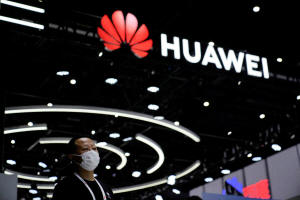|
Despite sales increasing a mere 0.02%, rotating chairman Eric Xu
struck an upbeat tone in the company's annual New Year's letter,
where he revealed the figure.
"U.S. restrictions are now our new normal, and we're back to
business as usual," Xu wrote in the letter that was addressed to
staff and released to media.
Revenue for the year is expected to be 636.9 billion yuan
($$91.53 billion), according to Xu.
That represents a tiny increase from 2021, when revenue hit
636.8 billion yuan, and marked a 30% year-on-year sales tumble
as the U.S. sanctions on the company took effect.
Xu's letter did not mention Huawei's profitability. The company
typically discloses its full annual results in the following
year's first quarter.
Revenue for 2022 still remained well below the company's record
of $122 billion in 2019. At the time the company was at its peak
as the top Android smartphone vendor globally.
In 2019, the U.S. Trump administration imposed a trade ban on
Huawei, citing national security concerns, which barred the
company from using Alphabet Inc's Android for its new
smartphones, among other critical U.S.-origin technologies.
The sanctions caused its handset device sales to plummet. It
also lost access to critical components that barred it from
designing its line of processors for smartphones under its
HiSilicon chip division.
The company continues to generate revenue via its networking
equipment division, which competes with Nokia and Ericsson. It
also operates a cloud computing division.
The company began investing in the electric vehicle (EV) sector
as well as green technologies around the time sanctions took
effect.
"The macro environment may be rife with uncertainty, but what we
can be certain about is that digitisation and decarbonisation
are the way forward, and they're where future opportunities
lie," said Xu in the letter.
(Reporting by Josh Horwitz; Editing by Muralikumar Anantharaman)
[© 2022 Thomson Reuters. All rights
reserved.]
This material may not be published,
broadcast, rewritten or redistributed.
Thompson Reuters is solely responsible for this content.

|
|





